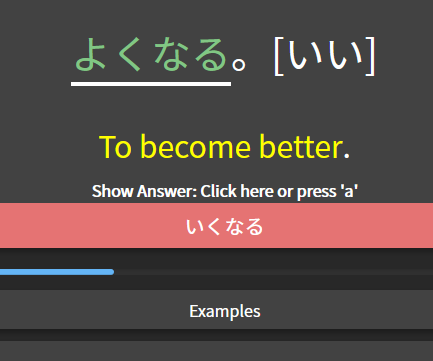to become
Structure
- なAdjective + になる
- いAdjective + くなる

I think this is my first ever post on the BP forums (after thousands over at WK!), so hello to everyone (anyone?) reading!
I start with a question! (One of many I fear as my Japanese, despite all my best efforts, is awful)!
Regarding “didn’t become quiet”… I get this one wrong again and again! I only got it right this time as it was the last in my queue and I repeated it a dozen times first.
I know it is “quiet”, しずか, plus になる (に because しずか is a na-adjective), and then the なる has to go into past tense negative - ならなかった.
It should be simple, but I keep putting しずかになかった! And tips on getting this straight? Where does that extra な and か come from?!

Welcome on community forums 
Glad to see a new face 
Not a problem, ask as many questions as you want, this is the purpose of this forum!
We have actually added this example precisely because it might cause troubles if seen in normal Japanese text. There are many examples like that here 
This is quite simple, but tongue twisting in the beginning.
静かになる。 to become quiet
静かになった became quiet/was quiet
静かにならない to not become quiet; simply a negative form
If we make ない to なかった we will get the negative past tense.
静かにならなかった didn’t become quiet, was not quiet
I hope that explanation helps!
It certainly does help! A wonderfully clear explanation! Thank you so much! Much appreciated!
No problemo 

I’m afraid I don’t understand this one.
Why doesn’t it become いくなる?
I feel bad “reviving this old topic,” but this seems like the most relevant place to post my question.
いい has special adjective rules that just need to be memorized but conjugates like an i-adjective
Unless grammar is going out of style, its all relevant  I really like how all the questions are organized under grammar points and can easily be read for future users (as long as users search their question before creating new topics that already exist). WK has struggled with this, new topics keep getting posted on the same questions from new users.
I really like how all the questions are organized under grammar points and can easily be read for future users (as long as users search their question before creating new topics that already exist). WK has struggled with this, new topics keep getting posted on the same questions from new users.
Thank you, you have cleared that up for me.
Before posting I did try to do my due diligence. I searched “ii” on jisho.org and “yoi” was the first thing to pop up, but for whatever reason I still couldn’t figure it out.
I have added information about the exception to the grammar point itself!
Thank you for your feedback 
I don’t understand the following as an answer for “It didn’t become quiet.”
しずかにならなかった
Why is it なら instead of なる? There’s nothing explaining this change on either grammar page. I’m so confused.
@kanelbullar Hey! The structure of this grammar point is な-Adjective + になる い-Adjective + くなる where なる is a verb meaning “to become.” Therefore, しずかになる means “to become quiet.” なる is a godan verb, so the negative (ならない) + past (かった) would be ならなかった. Since this sentence is not “It will become quiet,” but “It didn’t become quiet,” the negative past conjugation of なる is used. Hope this helps! Cheers.
Hello. I keep coming back to this grammar point and wonder why it doesn’t say anything about nouns. Are there any another grammar point that covers noun + になる? If not, wouldn’t it be better to add nouns (and example sentences) to this grammar point?
Example: 会社員になる
I had to look it up in Genki I to make sure I wasn’t going crazy xD
Hey 
We are most likely going to add Noun + になる as separate gramamr point. It is on the to do list. 
Cheers!
I suppose this is more of an English problem than a Japanese problem, and I suppose it sounds odd coming from a native English speaker, but I’m having a lot of trouble with this grammar point simply because I’m having issues telling when it should be present versus past tense.
Could anyone go through the tenses of to become with me in both English and Japanese?
@Evueimeimei Hey! I have updated the review questions for this grammar point to include hints about tense. Hopefully this will make the answer more clear. Below is a list of tenses of “to become” in both English and Japanese. Cheers!
| Tense | Affirmative | Negative | Affirmative | Negative |
|---|---|---|---|---|
| Non-past | To become/will become | To not become/will not become | なる | ならない |
| Non-past, polite | “” | “” | なります | なりません |
| Past | Became | Did not become | なった | ならなかった |
| Past, polite | “” | “” | なりました | なりませんでした |
Thank you! That helps a lot.
冬に夜5時から暗くなります.
In the winter, it becomes dark after five p.m.
What is “夜” (night) doing in this sentence? Why do not just say it this way:
冬に5時から暗くなります.
In this instance, 夜 means p.m.
You can also say 午後 if you want but I don’t generally hear that in day-to-day life.
5時 would generally mean 5a.m. So many people also say 17時
Thank you very much, I only seen the 午後 version before 
I thought of this while keeping conjugating 静かにならなかった incorrectly:
静かにならなかった means “did not become quiet”
then what would “became not quiet” is?